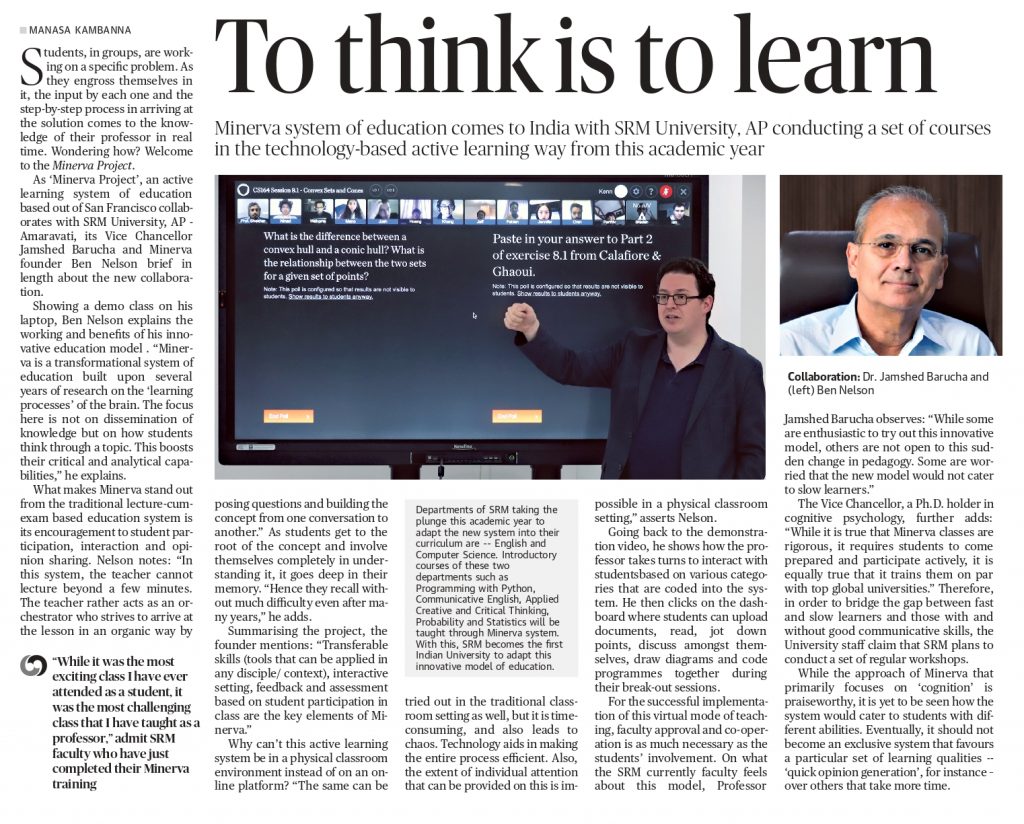
Minerva system of education comes to India with SRM University, AP conducting a set of courses in the technology-based active learning way from this academic year
Students, in groups, are working on a specific problem. As they engross themselves in it, the input by each one and the step-by-step process in arriving at the solution comes to the knowledge of their professor in real time. Wondering how? Welcome to the Minerva Project.
As ‘Minerva Project’, an active learning system of education based out of San Francisco collaborates with SRM University, AP – Amaravati, its Vice Chancellor Jamshed Barucha and Minerva founder Ben Nelson brief in length about the new collaboration.
Showing a demo class on his laptop, Ben Nelson explains the working and benefits of his innovative education model . “Minerva is a transformational system of education built upon several years of research on the ‘learning processes’ of the brain. The focus here is not on dissemination of knowledge but on how students think through a topic. This boosts their critical and analytical capabilities,” he explains.
- Departments of SRM taking the plunge this academic year to adapt the new system into their curriculum are — English and Computer Science. Introductory courses of these two departments such as Programming with Python, Communicative English, Applied Creative and Critical Thinking, Probability and Statistics will be taught through Minerva system. With this, SRM becomes the first Indian University to adapt this innovative model of education.
What makes Minerva stand out from the traditional lecture-cum-exam based education system is its encouragement to student participation, interaction and opinion sharing. Nelson notes: “In this system, the teacher cannot lecture beyond a few minutes. The teacher rather acts as an orchestrator who strives to arrive at the lesson in an organic way by posing questions and building the concept from one conversation to another.” As students get to the root of the concept and involve themselves completely in understanding it, it goes deep in their memory. “Hence they recall without much difficulty even after many years,” he adds.
Summarising the project, the founder mentions: “Transferable skills (tools that can be applied in any disciple/ context), interactive setting, feedback and assessment based on student participation in class are the key elements of Minerva.”
Why can’t this active learning system be in a physical classroom environment instead of on an online platform? “The same can be tried out in the traditional classroom setting as well, but it is time-consuming, and also leads to chaos. Technology aids in making the entire process efficient. Also, the extent of individual attention that can be provided on this is impossible in a physical classroom setting,” asserts Nelson.
Going back to the demonstration video, he shows how the professor takes turns to interact with students based on various categories that are coded into the system. He then clicks on the dashboard where students can upload documents, read, jot down points, discuss amongst themselves, draw diagrams and code programmes together during their break-out sessions.

Collaboration Dr. Jamshed Barucha and (left) Ben Nelson
For the successful implementation of this virtual mode of teaching, faculty approval and co-operation is as much necessary as the students’ involvement. On what the SRM currently faculty feels about this model, Professor Jamshed Barucha observes: “While some are enthusiastic to try out this innovative model, others are not open to this sudden change in pedagogy. Some are worried that the new model would not cater to slow learners.”
The Vice Chancellor, a Ph.D. holder in cognitive psychology, further adds: “While it is true that Minerva classes are rigorous, it requires students to come prepared and participate actively, it is equally true that it trains them on par with top global universities.” Therefore, in order to bridge the gap between fast and slow learners and those with and without good communicative skills, the University staff claim that SRM plans to conduct a set of regular workshops.
While the approach of Minerva that primarily focuses on ‘cognition’ is praiseworthy, it is yet to be seen how the system would cater to students with different abilities. Eventually, it should not become an exclusive system that favours a particular set of learning qualities — ‘quick opinion generation’, for instance – over others that take more time.
Source: https://www.thehindu.com/education/to-think-is-to-learn/article28243928.ece

